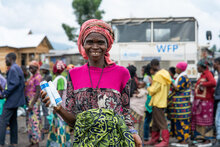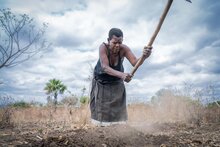Belgian Government Contribution Helps Saves Lives In Mali
“The Belgian Government has been working alongside the Malian Government for more than 20 years. It remains committed to Mali and its people and will continue supporting populations, especially vulnerable communities in northern Mali who bear the brunt of the crisis,” Myriam Bcquelaine, Chief of Belgium’s Diplomatic Corps in Mali in said.
This contribution also reinforces the Belgian Government and WFPs partnership in Mali.
“This funding came at just the right time. The 2016 National Humanitarian Response Plan was only funded at 30 percent even though humanitarian needs, especially food security and nutrition needs, remain high.” Silvia Caruso, WFP’s Representative in Mali said.
The past four years have been particularly difficult for the populations living in northern and central Mali; they have been battling both severe drought and continued conflict. Despite the challenges populations in Northern Mali face on a daily basis, financial constraints have forced WFP to drastically cut its operational support for refugees and internally displaced persons, completely suspend the school meals programme and reduce its support for children and pregnant and nursing women suffering from moderate acute malnutrition.
“The Belgian contribution will enable WFP to re-launch the school meals programme in approximately 500 schools and rapidly respond to emergency situations throughout the country. However, 69,000 children in close to 400 schools will not receive school meals because of a lack of funding; additional resources are necessary to ensure that all targeted children receive school meals” Caruso added.
Malnutrition affects one in three children in Mali; latest figures show a Global Acute Malnutrition (GAM) rate of 12.4 percent among children under five across the country. In the region of Timbuktu, this rate rises to 17.5 percent, exceeding the World Health Organization’s critical emergency threshold.
Malnutrition presents serious health risks for children, and can be fatal; it slows intellectual development, saps productivity and perpetuates poverty among affected communities.
Between now and the end of 2016, WFP has the capacity to provide cash based transfers to 27,000 IDPs and refugees in northern Mali, provide school meals to 77, 510 children in close to 500 schools and treat 9,060 children under 5 and 890 pregnant and nursing mothers suffering from moderate acute malnutrition.
# # #
WFP is the world's largest humanitarian agency fighting hunger worldwide, delivering food assistance in emergencies and working with communities to improve nutrition and build resilience. Each year, WFP assists some 80 million people in around 80 countries.
Follow us on Twitter: @WFP_WAfrica, @WFP_media
For more information, please contact (firstname.secondname@wfp.org):
Laura Morris, WFP/Bamako: +223 75 81 44 67
Adel Sarkozi, WFP/Dakar: +221 776375964


